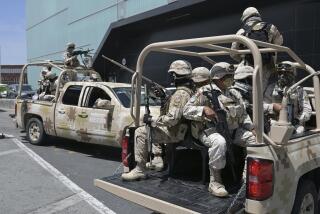Tough, Empty Cuba Policy
Talking tough to Fidel Castro usually pays off with votes in Florida, even if it doesn’t move Castro or help forge a viable U.S.-Cuba policy. Hence President Bush’s latest Cuban initiative, which amounts to little more than election-year pandering.
Not that he is the first president to play that game. In 1992, after initially opposing it, George H.W. Bush signed the Cuban Democracy Act, which restored the ban on trade with Cuba, probably because he feared that his opponent, Bill Clinton, would use the issue to help win the Florida vote. In 1996, President Clinton signed the infamous Helms-Burton law that imposed sanctions on foreign investors in Cuba -- and he won Florida. In the 2000 election, both candidates promised to get tough with Castro, and the vote was so tight that the winner ultimately had to be decided by the Supreme Court.
For 2004, the president has promised to stiffen sanctions against Cuba’s communist regime. From now on, Cuban Americans who used to be able to travel to see their relatives once a year can do so only every three years. The new policy also reduces the amount of money they can spend on the island from $164 per day to $50.
Another part of the plan deals with Radio and TV Marti, two U.S.-government-sponsored broadcasting services that Cubans haven’t heard or seen since their inceptions in the 1980s because Castro’s operatives block the signals. U.S. taxpayers will now spend an additional $18 million for technology upgrades, including an airplane that supposedly will outsmart the Cuban intelligence services.
Last but not least, the Bush administration plans to spend $36 million more to support the anti-Castro political opposition in Cuba.
These measures, mostly rehashed ideas, do little to hasten political reform, instead lending a hand to a dictator who uses such acts to strengthen his rule. Restricting travel to force a repressive regime to open up sounds contradictory. And does it make any sense to spend $18 million more on a project like Radio and TV Marti that has never worked?
Offering $36 million to Cuban dissidents is tantamount to giving them the kiss of death. They would immediately be labeled “agents of the American imperial power” and probably imprisoned.
Castro will be 78 in August. Come January, he will celebrate his 46th year in power. Ten U.S. presidents have tried to oust him and failed. This administration, strapped for cash to keep out terrorists and conduct the war in Iraq, ought to at least stop the bleeding of taxpayer dollars on such low-return enterprises.
More to Read
Start your day right
Sign up for Essential California for news, features and recommendations from the L.A. Times and beyond in your inbox six days a week.
You may occasionally receive promotional content from the Los Angeles Times.






